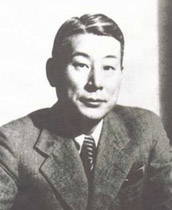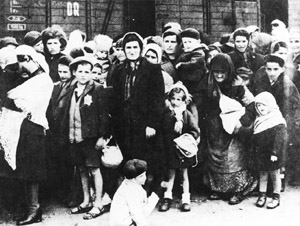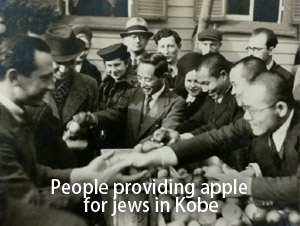Sempo (Chiune Sugihara)
Chiune Sugiura was born in 1900 and was a Japanese diplomat. While he was a consulate in Kaunas in Lithuania in 1940, he issued visas for the Jewish refugees and rescued about 6000 lives.
In those days in Europe, oppression by Nazis was getting strong. And at the same time other European countries including the U.S. had closed the door to the Jewish refugees.

When Germany invaded Poland in 1939, there was no choice for the Jews living in Poland but to escape into Lithuania. But Lithuania was under the threat of Soviet Union. So they did not have any effective evacuation route after that for them.
Their possible evacuation route was to go across the Soviet Union to the east but the Soviet Union would never issue visas for them. But if they have a visa to go to the other nations through Japan issued by the Japanese government, it would be possible for them not only to enter Japan but also go through the Soviet Union on the way.
Seeking this only solution, many refugees rushed to Japanese consulate. And about 20,000 refugees escaped to the settlement in Shanghai, because it was the only place which opened the door to the Jews in the world at that time.
Sugihara helped the refugees who were mostly Jews, issuing visas according to the policy of no racial discrimination of the Japanese government in those days and also the humanitarian point of view, for which he devoted every minute for several weeks. The visas issued at that time were more than 2,000 and they needed one for each family. So it is said that those visas saved the lives of 6,000 people.
Clear the Air
Here I would like to remove the misunderstanding concerning the visas of Sugihara.
- the misunderstanding that Sugihara was forced to leave Lithuania as a punishment of having issued visas against the will of the Japanese government.

He left Kaunas of Lithuania but the consulate there was going to be closed because of the pressure of the Soviet Union anyway. After leaving Kaunas, he went to Prague by way of Berlin and served as a deputy consul general in Prague consulate.
He was awarded a medal of order 5 while he served as a 3rd class secretary of a Rumania legation in 1944. Therefore it was not because of the issues of the visas that he was fired from the foreign ministry after the war.
After the war, the work of the foreign ministry was reduced greatly, and as a result a third of the diplomats were forced to resign. It is no wonder that he was made to resign because he was not non carrier assembly, and he was not a graduate from Tokyo university.
Also, according to Asahi Newspaper on October, 22nd, 2019, it was newly dscovered that he worked as a manager of Upeer House Material Division after his retirement after the war was over.
(2) Sugihara was a righteous man, but the Japanese government was cold to the Jews.

This is also a big misunderstanding. For sure the Japanese government showed some kind of disapproval when Sugihara asked for the permission for issuing visas to the Jewish refugees. But it was a response based on the common sense. In fact, the Japanese government accepted Sugihara’s issuing visas. It is so obvious to mention but visas are a minimum condition to enter a nation but they are no guarantees for entering a nation.
The Jewish refugees with Sugihara visas arrived in Vladivostok in the Soviet far east were able to continue escaping because Saburo Nei of Vladivostok consulate helped them. Saburo Nei gave credit to the Sugihara visas which were suspected of its validity. Not only that he issued visas to those who had lost them. Also, he issued embarkation permit for Japan which were only given to those who were engaged in fishing. This is how he contributed to rescuing the refugees.
The ship which left Vladivostok arrived in Tsuruga port in Japan. The refugees, since they had not had enough money with them, were not supposed to given landing permit. However, other officials there helped them.
Also the Jews were supposed to be able to stay in Japan only for 10 days. But Yosuke Matsuoka, the foreign minister, allowed the extension of the permit to stay until 30 days. The fact that this foreign minister made such a judgment has a great significance, because it shows that the rescue of these Jews was approved by the Japanese government.



